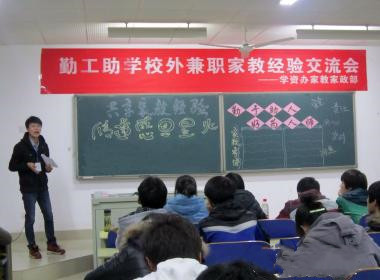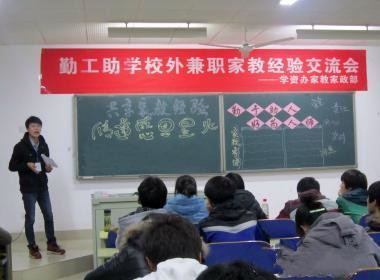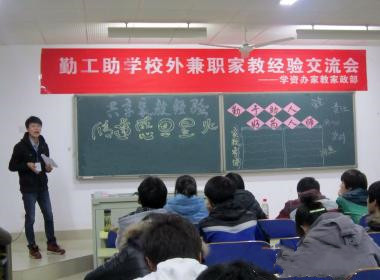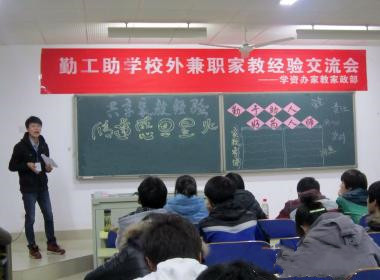![]() 初一下英语U6同步教材
初一下英语U6同步教材
【词语分析】
1. poem 诗,韵文
◆ an English poem 一首英文诗
He wrote some poems in English. 他用英语写了几首诗。
He wrote a poem about spring. 他写了一篇关于春季的诗。
词义辨析:poem: 一般指一首诗或诗体文,是可数名词。
poetry: 指诗的总称,是不可数名词。
poet: 指诗人,是可数名词。(poetess 女诗人)
◆ What kind of poetry do you like? 你喜欢哪种诗?
Mr. Smith was a lover of poetry. 史密斯先生是一名诗歌喜好者。
Li Bai is a great poet in Chinese history. 李白是中国历史上一位伟大的诗人。
2. have fun = have a good time = enjoy oneself 玩得高兴,过得愉快
注意:fun 是名词,表示“有趣的事”。
◆ You will be sure to have fun at the party. 今晚的聚会上,你必然会玩得非常高兴。
What fun we have! (注意感叹句的使用方法)
3. end 末端, 结尾
◆ They ended the party with a song. 他们以一首歌结束了聚会。
end 结束
◆ How does the story end? 这个故事结局怎么样?
Now I want to know about this thing from beginning to end. 我目前想源源本当地知道此事。
词组:at the end of … 在…的末端;在…的结束
◆ At the end of the film, the hero cried sadly. 在影片的结尾,主人公伤心地哭了。
There is a shop at the end of the street. 这条街走到头有一个商店。
4. temperature 气温, 温度
◆ The nurse took the temperature of all the patients. 那位护士给所有些患者量了体温。
The temperature tonight will fall to seven degrees Celsius. 今晚气温将降低到七摄氐度.
temper 脾气, 情绪
◆ His father is in a bad temper today. 他爸爸今天情绪不好。
I hope he can control his temper. 我期望他能克制住我们的脾气。
5. drop 减少, 降低 ;(使)落下, (使)掉下
◆ The temperature has dropped since last week. 从上周就已经开始降温了。
Be careful! Don’t drop it. 拿好,别掉了。
I dropped the letter into the mail box. 我把信投入信箱。
drop 滴;水滴
◆ The rain was leaking in large drops through the roof. 雨正大滴大滴地从屋顶上漏下来。
Another drop of water fell with a soft plop. 又一滴水嘀嗒一声落下。
6. shiver 发抖
◆ She shivered at the thought of going into the dark house alone.
她想到要一个人一人去那黑暗的房屋就不寒而栗。
I shivered and pulled my scarf more tightly round my neck.
我打了个寒战,用围巾把脖子围得更紧了。
shiver 发抖
◆ A shiver ran down her spine. 她浑身哆嗦了一下。
It kept him in a cold shiver all the time. 这让他不停地打寒噤。
7. awful 糟糕的,极讨厌的 (近义词:terrible)
◆ What awful weather! We have to stay at home. 多糟糕的天气,大家只得呆在家。
We had an awful earthquake here last year. 去年大家这里发生了一次可怕的地震。
awfully 可怕地,糟糕地
◆ I’m awfully sorry for stepping on your foot. 踩了你的脚,实在抱歉。
That man acted awfully. 那个男子演技非常差。
8. disappointed 失望的,沮丧的
◆ We are disappointed that you will not be able to come. 你不可以来,大家非常失望。
We were disappointed at the results. 大家对结果感到失望。
disappoint 使失望,使沮丧
◆ The film disappointed them. 这部电影令他们非常失望。
I’m sorry to disappoint your hope. 对不起,我使你失望了。
disappointed 让人失望的
◆ The performance is disappointing. 这场演出让人失望。
The wine was excellent, but the food was disappointing. 酒棒极了,但饭菜却叫人不敢恭维。
disappointment 失望,让人失望的人或者物
◆ To his disappointment, all the tickets have been sold out. 让他失望的是,所有些票都卖完了。
She couldn’t hide her disappointment. 她没办法掩饰自己失望的情绪。
9. sadly 伤心的
◆ he shook his head sadly. 他伤心地摇了摇头。
Sadly, we could only stay there for three weeks. 让人遗憾的是,大家只能在那儿呆三周。
sadness 悲哀,悲伤,哀愁
◆ There was some sadness in her voice. 她的声音中带有几分伤感。
The jokes were a mask to hide his sadness. 玩笑是掩盖他内心悲伤的方法。
【词组总结】
1. 季节,赛季 / 季节的 adj. season / seasonal
2. 描写 / 描述 describe / description
3. 一块硬石头 / 辛苦的工作 a hard stone / hard work
4. 努力工作 / 勤奋的 work hard / hard-working = diligent
5. 几乎不 hardly = almost not
6. 开始/ 出发 start = begin / start = set out
7. 诗歌 / 诗人 poem / poet
8. 成人 adult = grown-up
9. 筑巢 make a nest
10. 玩得高兴 have a good time = have fun = enjoy oneself
11. 结束 终点/ 无尽的/ 结尾 end / endless / ending
12. 在。。。尽头/ 最后 at the end of / in the end
13. 摔倒/ 入睡/ 从。。。掉下来 fall fell fallen / fall asleep / fall off
14. 在秋季/ 瀑布/ 落叶 in fall / waterfall / fallen leaves
15. 睡觉/ 熟睡的/ 困的 sleep / asleep / sleepy
16. 脾气/ 坏脾气的 temper / bad-tempered
17. 量。。。体温 take one’s temperature
18. 掉下/ 顺便拜访 / 一滴水 drop dropped / drop in / a drop of water
19. 冬眠 (v.)/ hibernate / hibernation =winter sleep
20. 让门一直关着(开着) keep the door closed
21. 自然/ 自然的 nature / natural
22. 糟糕的 awful = terrible
23. 是某人做某事/ 被迫做某事 make sb. do = have sb. do / be made to do
24. 看到某人做某事/ 听到某人做某事 see sb. do / hear sb. do
25. 一场大雨/ 下大雨 a heavy rain / rain heavily
26. 去春游 go for a spring outing
27. 傻的 silly / stupid / foolish/dull
28. 上气不接下气/ 失去控制/ 过时 out of breath / out of control / out of fashion
29. 进行野餐/烧烤 have a picnic / a barbecue
30. 懒惰的/ 懒惰地 lazy / lazily
31. 一直 all the time = always
32. 伤心的/ 伤心地/ 伤心 sad / sadly / sadness
33. 什么都没发现 find nothing = not find anything
34. 饥饿 / 饥饿的/ 怒气/ 生气的 hunger / hungry / anger / angry
35. 在树林里/ 在森林里 in the woods / in the forest
36. 使。。。失望 / 感到失望的 disappoint / disappointed
让人失望的/ 失望 disappointing / disappointment
37. 最后 at last = finally = in the end
38. 充足的 plenty of
39. 。。。如何了? what’s the matter…= what’s wrong…
40. 探寻/ 找到/ 听/ 听到 look for / find / listen to / hear
【句型分析】
1. The holidays are coming. 假期就要来了。 The holidays are ending. 假期就要结束了。
用目前进行时表以后。目前进行时除去描述正在发生的动作以外,还常常用来描述马上发生的事情。
◆ --- Where are Kitty and Alice? --- They are playing tennis in the park. (表示正在发生的事情)
Ben is seeing the dentist on Friday. (表示对以后的安排或计划)
2. --- What does spring make you think of ? --- Spring makes me think of rain.
make somebody do something 表示“使/让某人做某事,make 意为“促进;使得”。
◆ The cool weather makes me feel comfortable. 凉爽的天气使我感到舒适。
My boss makes me work 12 hours a day. 我的老板天天让我工作12个小时。
think of 意为“想到,想起;觉得...如何”。
◆ I think of my hometown when I saw the beautiful scenery. 看见这漂亮的景色,我想起我的家乡。
What does the photograph make you think of ? 这张照片叫你想起了什么?
I can’t think of his name at the moment. 我一时想不起他的名字。
拓展:think about 意为“考虑;对...有某种怎么看”。
◆ They are thinking about buying a new car. 他们正在考虑买一辆新车。
What do you think about the TV play? 你觉得这部电视剧如何?
拓展:think over 意为“复习;仔细考虑”。
◆ We need several days to think over this matter. 大家需要几天时间仔细考虑这件事。
Think over the matter and then make a decision. 这件事情斟酌斟酌再定。
3. It is interesting to see them flying around the flowers.
此句是用it 作形式主语的句子,真的的主语是to walk in wet and dirty streets.
It is + adj. + to do sth. 意为“做某事如何”
◆ It is necessary to have an air-conditioned classroom in our school. 学校需要一间有空调的教室。
It is dangerous to play in the street. 在街上玩耍非常危险。
see somebody do something 表示“看见某人做某事,强调动作的全过程”。
see somebody doing something 表示“看见某人正在做某事,强调动作正在进行”。
◆ I saw him enter into the classroom. 我看看他进入了教室。
I saw him singing in the classroom. 我看见他正在教室唱歌。
4. All summer, the grasshopper sat in the sun and sang happily all the time.
all summer:整个夏季。all 后面加一段时间的名词常常作为句子的时间状语。
◆ I did my homework all evening. 我一晚上都在做家庭作业。
Her work chained her to her desk all day. 工作使她整天不能离开办公桌。
in the sun 表示“在太阳底下,在阳光下”,不能说“under the sun”。
◆ The leaves become dry in the sun. 叶子在骄阳下都干了。
The wet clothes will soon dry in the sun. 湿衣服在太阳下非常快就会干的。
5. There will be plenty of food in the forest in winter. 这是 there be 句型的一般以后时使用方法。
there be 句型容易见到于一般目前时、一般过去时、一般以后时和目前完成时中。
◆ There is a train every hour. (时态:________________ )
There was a good film on TV last night. (时态:________________ )
This road is very dangerous. There have been many accidents. (时态:________________ )
I’m going away tomorrow. I’ll do my packing today because there won’t be time tomorrow.
(时态:________________ )
6. What’s the matter , my friend?
= What’s wrong with you? = What’s the trouble with you? = What’s the problem?
= What’s troubling you?
7. He collected food and took it into his house.
Would you please take the suitcase into my room for me?
注意 take 的使用方法:
◆ 拿;取 I want to take some books to the classroom.
吃;喝;服用 Take this medicine three times a day.
乘车(船) They usually take a bus to work.
花费(时间,资金) How long will it take you to do your homework every day?
做...事情 take a walk; take a rest; take a look; take away; take care;
take good care of; take down; take out; take off
8. He felt cold, hungry and disappointed. 系动词 + 形容词 (系表结构)
◆ It smells good. The boy looks sad.
The price sounds reasonable. Silk feels smooth.
A. awful B. when C. to lie D. boating E. Have a good time F. activities G. flowers H. think of I. amazing |
Many people like spring,because they can go out and do many kinds of activities. If people are asked what spring makes them ___1___, guess what they would say. We made a survey about the ___2___ that people like to do in spring. Here are the results.
Scott: In spring, I often visit my uncle and I like fishing with him. I also like ___3___ and enjoy the beach. Last spring, my uncle and I went boating. The dolphins came so close to us. It was very ___4___. I hope that I can go there again soon.
Linda: My favourite spring activity is gardening. I think it is relaxing to work in the garden. I grow many ___5___ in my garden every year. They are so beautiful.
Nancy: I love spring. I love going to the beach and spend a whole day there. It is so relaxing ___6___ on the beach. I also like surfing in the sea.
James: I am twelve years old. My favourite spring activity is swimming. I started to learn swimming ___7___ I was seven years old. I always ___8___ with my friends in the river.
4、课堂小结
1. 一般以后时:表示_____________________,常用时间状语有_____________________,容易见到两种结构分别为_____________________,_____________________。(考试知识点)一般以后时与There be句型相结合可构成_____________________,_____________________。
2. 系表结构:_____________________ 容易见到系动词: 1. 状况类:_____________; 2. 表象类:_____________, _____________, _____________; 3. 感官类:_____________, _____________, _____________, _____________; 4. 持续类:_____________, _____________, _____________, _____________; 5. 变化类:_____________, _____________, _____________, _____________; 6. 终止类:_____________, _____________, _____________; |
5、 课后作业
Exercise for Grammar
I. Choose the best answer.
1. --- You’ve dropped ____________ “s” in the word “across”.
--- Oh, ____________ letter “s” should be doubled.
A. a, a B. an , a C. an, the D. the, the
2. It is ____________ to read all kinds of books.
A. interested B. interesting C. interested in D. interested of
3. At the end of May, children start ____________ their holiday.
A. thinking out B. thinking over C. thinking about D. thinking at
4. In winter, dogs enjoy lying ____________ the sun.
A.in B. to C. on D. at
5. Have you ever watched the ants ____________ under the trees?
A. working B. works C. to work D. worked
6. He spoke to me in a ____________ way.
A. kindly B. friendly C. carefully D. patiently
7. ____________ it is to go fishing in such fine weather!
A. What a fun B. How a fun C. What fun D. How a fun
8. It’s very kind ____________ you to help me get the ticket ____________ the concert.
A. for, for B. for, of C. of, of D. of, for
9. “Don’t worry. There will be ____________ food in the forest in winter.” said the grasshopper.
A. a few B. many C. plenty of D. little
10. ____________ good idea it is to have a picnic on such a fine day!
A. What a B. How C. What D. How a
11. I don’t like milk, but my mum makes me ____________ it every day.
A. drink B. to drink C. drinking D. drunk
12. The weather was _________ cold _________ the grasshopper couldn’t fine anything in the forest.
A. too, to B. very, that C. so, that D. so, to
13. We had ____________ rain and snow this year than last year.
A. few B. fewer C. less D. little
14. You can’t find Tim, for he ____________ the library.
A. has gone to B. has been C. has been to D. went to
15. Tell Tom ____________ to lock the door before leaving the room.
A. not to forget B. to forget C. don’t forget D. Forget
II. Complete the sentences with the given words in their proper forms.
A. only in special animal food stores | B. in the animal hospitals |
C. in nearly all stores in Canada | D. from some families |
4. The bird feeder in the garden is used for ____________.
A. providing food for their own birds | B. offering food to birds in need |
C. giving food to the injured birds | D. attracting more birds to come |
5. If a truck runs over a wild animal accidentally, ____________.
A. the driver will feel upset | B. the drive will be killed |
C. the driver will be punished | D. the driver will take it home |
6. ____________ leads to the problem that pets can solve in Canada.
A. Friendship between Canadians and animals B. The family tie that is not so close
C. Feeling lonely D. Killing animals and running them over
II. Choose the words or expressions and complete the passage.
Being safe in your everyday life needs knowledge. If you remember the following information, your life will be much safer.
Always __________ the environment around you. You shouldn’t walk alone outside. Make sure where the public phones are. If __________ dangerous happens, you can find them easily.
Your bag should be carried towards the front of your body instead of putting it on your back. When a bus is full of people, it is easy enough for a __________ to take away the things in the bag on you back.
If you are followed by someone you don’t know, cross the street and go to the other way, let the people understand that you know he or she is __________ you. Next, don’t go home at once. You are safer in the street that you are alone in your __________ or in a lift.
If you have to take a bus to a place far away, try to get to the sTOP a few minutes earlier before the bus leaves. This sTOPs other people from ____________ you. On the bus, don’t set alone. Sit behind the driver or with other people. Don’t sleep.
7. A. notice 8. A. everything 9. A. murder 10. A. with 11. A. home 12. A. hurting | B. protect B. nothing B. thief B. before B. school B. helping | C. look C. anything C. driver C. after C. car C. studying | D.remember D.things D.friend D.around D.way D.calling |
III. Fill in the blanks with proper words. The first letters are given.
Cold air. Snow. Shorter days. We are in winter now. Winter is the coldest season o_____13______ the year. It comes between autumn and spring. For us, the winter months are usually November, December and January. But that is only because we live in the n_____14______ part of the Earth. In China, winter is the time between the end of autumn and the beginning of spring. But, this is the time that the southern part of the Earth has i_____15______ summer. Imagine when we are playing with snow, Australian kids are enjoying ice cream! Winter isn’t always gray. It can also be bright. Here’s h_____16______.
Put on a holiday play and try a_____17______. Ask your cousins or classmates to come to your house and make beautiful clothes and write a play. Act it out for your family. Play around. Go outside and enjoy yourself. Make a snowman with your friends. If you really have to stay indoors, make your room c_____18______ and decorate it. You’ll find it a lot of fun.
Exercise for More Practice and Writing
I. Answer the questions.
Ever since new rules and behavior standards for middle school students have come out, the middle schools have been using a new way to decide who the TOP students are. The best students won’t only have high grades. They should not dye their hair, smoke or drink. The following are some of the new rules.
Do more at school. Good students love animals and care for other people. April is Bird-loving Month in China. What is your school doing for it? Would you like to join? You will learn more about animals and know how to protect them. Be friendly to the people around you. Try to think more of others than you do of yourself.
Be open to new ideas. Do you think people can live on the moon? Maybe you’ll find another earth some day. Don’t look down on new ideas. Everyone’s ideas are important. You should welcome them, because new ideas make life better for everyone.
Protect yourself. Has someone ever taken money from one of your classmates? Don’t let it happen to you. If you have to go home late, you should let your parents know.
Use the Internet carefully. The Internet can be very useful for students. But some things on the Internet aren’t good for children, so try to look at web pages that are helpful to you.
 Write a passage of at least 60 words on the TOPic “I want to become a/an ____________”(以“我期望成为____________”为题目写不少于60个词的短文,标点符号不占格)
Write a passage of at least 60 words on the TOPic “I want to become a/an ____________”(以“我期望成为____________”为题目写不少于60个词的短文,标点符号不占格) 






